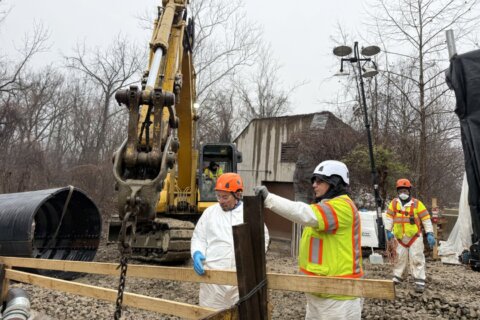Montgomery County police say they’re getting better at identifying officers who are struggling with mental health issues, and with providing access to mental health care.
On Sunday night, Montgomery County police responded to an incident in which an officer was reported to be “in distress” in their patrol car in Potomac, Maryland. After 15 hours, police reported the incident ended safely, with the officer taken to an area hospital.
“We’re doing a lot better job at identifying officers that are having issues and trying to work with them (to get healthy and) to get back on the street,” Montgomery County Assistant Police Chief David McBain said.
Michael Uh, chief psychologist for the Montgomery County Police Department’s Stress Management Office, agreed. The proactive approach to mental health in the county department, according to Uh, “is something that I was always hoping for and I’m very, very happy to see it happening.”
Uh said the nature of police work is incredibly stressful, with officers having to race to the scene of emergencies during which other people’s lives may be on the line. While the scene may be chaotic, it’s up to the officers to establish order and safety.
“The amount of mental energy that is required to respond in that manner and respond effectively, it’s just a tremendous amount of mental strain,” Uh said.
Another issue that compounds the mental strain on officers, Uh said, is the fact they can be called on to respond to one trauma after another.
“Basically, the police officer is going from crisis to crisis,” he said. “That might just be one day of work.”
“A citizen would experience maybe two or three traumatic events in their lifetime,” but officers witness or experience “somewhere in the realm of 170, that might be the average,” Uh added.
Establishing a work-life balance is a challenge for anyone, but for police, there can be an added strain.
“They have to pretty much flip the switch, so to speak, and go into dad mode or husband or wife or mom mode,” Uh said. “It’s a really tough transition, for sure.”
Officer wellness also extends to the officers’ families.
“The family members are just as important to an officer’s wellness as concentrating on what the officers are going through,” Uh said.
So making sure that families have access to mental health care is important, apart from what the police officer may be experiencing, he said.
According to Uh, there is a trend toward emphasizing the wellness for first responders and in the military as well. He attributed part of that to the pandemic, when first responders were “in the heart of the storm” while things were at their worst.
Asked about whether there’s still a stigma among first responders, who are often called upon to assist others, Uh said he believes it’s changing.
“I definitely noticed that the younger officers are more open to this,” he said, referring to asking for mental health help. “I think there definitely is less of a stigma with them.”
Uh said he finds it gratifying that those officers will be in leadership positions at some point.
While it’s important for departments to provide an open door to mental health services, Uh said, the most powerful messages come from officers’ peers.
Change happens, Uh said, when members of the department “are going out to their fellow officers saying, ‘Hey, I struggled a little bit — or I struggled a lot — and I went to go get help, and now I’m back on duty.'”
Get breaking news and daily headlines delivered to your email inbox by signing up here.
© 2025 WTOP. All Rights Reserved. This website is not intended for users located within the European Economic Area.








